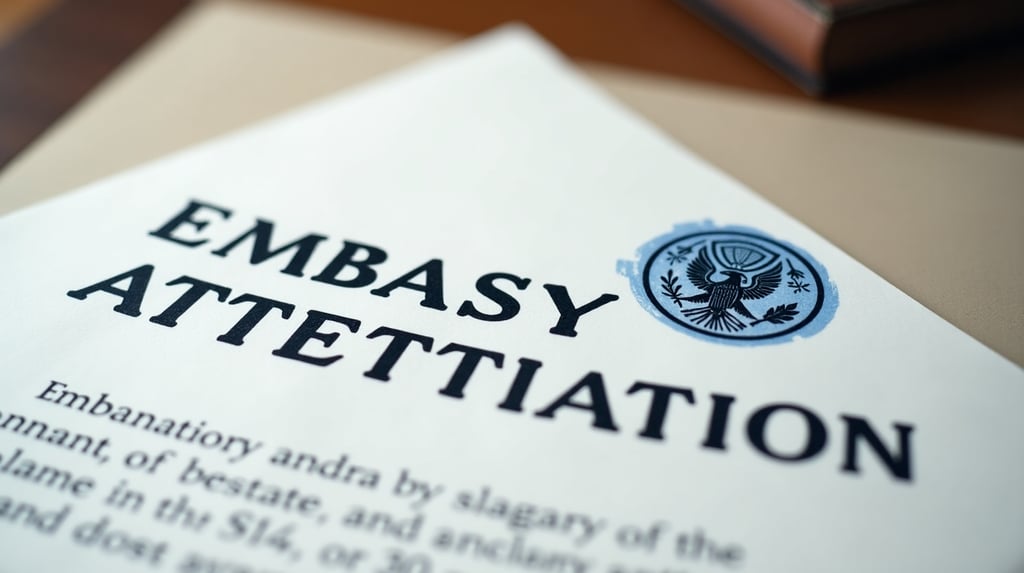Apostille & Embassy Attestation Made Easy
Discover everything you need to know about apostille and embassy attestation. Learn about the requirements, timeline, and charges involved in the process to ensure a smooth experience.
11/18/20257 min read


Understanding Apostille and Embassy Attestation
Apostille and embassy attestation are two distinct processes used for the legalization of documents intended for international use. Both methods serve to authenticate the origin of documents, ensuring that they are accepted by foreign authorities. However, the choice between these two depends on various factors, including the destination country and the nature of the documents involved.
An apostille is a specialized certificate attached to a document, which verifies its authenticity in countries that are signatories to the Hague Convention of 1961. This process simplifies the verification of documents across borders by providing a standardized certificate that guarantees their legitimacy. Common documents that may require an apostille include birth certificates, marriage licenses, and educational qualifications. By affixing an apostille, the issuing authority certifies that the document is genuine and can be recognized abroad without the need for further verification.
On the other hand, embassy attestation is often necessary for documents that are intended for use in countries that are not part of the Hague Convention. This process involves getting a document verified by the embassy or consulate of the destination country. Embassy attestation is typically required for legal documents like power of attorney, commercial invoices, and business contracts. The embassy or consulate examines the document to ensure its authenticity before issuing their stamp or seal, confirming that the document is valid for use in their respective country.
Understanding the differences between apostille and embassy attestation is vital for individuals and businesses involved in cross-border activities. Knowing which process to follow can significantly expedite the documentation process and ensure compliance with legal requirements in foreign jurisdictions. As global interactions increase, the importance of these legalizations becomes more significant, enabling smoother transitions for personal and professional endeavors in international landscapes.
Requirements for Apostille
Obtaining an apostille is a crucial process for documents that need to be recognized internationally, particularly under the Hague Convention. To start, it's essential to identify which types of documents are eligible for an apostille. Generally, public documents such as birth certificates, marriage certificates, and court statements are commonly apostilled. Additionally, notarized documents and certain educational credentials, like diplomas and transcripts, also qualify.
The first requirement for getting an apostille is the proper format of the document. For the apostille to be appended, the document must be an original or a certified copy. It is imperative to ensure that the document is both complete and accurate, as errors can lead to delays or even rejections. Any document that contains signatures from a public official may also require verification by that official's office prior to obtaining the apostille. Examples include notary public seals and signatures from government agencies.
Once you have confirmed that your document meets the necessary criteria, the next step involves identifying the appropriate authority responsible for issuing apostilles. In most jurisdictions, this could be the Secretary of State or an equivalent governmental body. It is worth noting that the specific authority may vary depending on the nature of the document and the state or country in which it was issued.
Additionally, it is important to clarify any additional paperwork that may be necessary. While a straightforward application for an apostille is typical, certain documents may also require supporting paperwork, such as a cover letter detailing the request. Furthermore, fees associated with the apostille process can vary widely, necessitating confirmation of the current charges with the issuing authority.
Requirements for Embassy Attestation
Embassy attestation is a crucial step for individuals and entities looking to validate their documents for use in foreign countries. Unlike the apostille process, which is generally designed for countries that are part of the Hague Convention, embassy attestation is employed in cases where the destination country requires additional verification directly from their respective embassies or consulates.
To begin the process of embassy attestation, it is important to identify the types of documents that are acceptable. Commonly accepted documents include educational certificates, commercial invoices, legal contracts, and personal documents such as birth or marriage certificates. Each embassy may have specific requirements regarding the format and condition of the documents; thus, it is advisable to consult the relevant embassy's website or contact their office for precise details.
In addition to ensuring the document type is acceptable, it is essential to be aware of any preparatory steps necessary before submission. This often involves obtaining a notarization. Notarization serves to verify the authenticity of the documents by a certified notary public, which can facilitate the embassy's attestation process. The notarized documents may need to pass through relevant local authorities, such as state or county offices, for further authentication. This procedural step helps streamline the process at the embassy level.
Different embassies and consulates may also have distinct policies and timelines, so it's important to account for possible variations in processing time. Typically, the submission should be done well in advance of any planned travel or legal obligations, as delays can occur due to varying workloads at the consulate or embassy. Proper preparation and understanding of these requirements will garner an effective embassy attestation experience, ensuring that your documents are correctly validated for international use.
Timeline for Apostille and Embassy Attestation
The timeline for obtaining apostille and embassy attestation can vary significantly based on several factors, including the type of document, the issuing authority, and the specific requirements of the destination country. Generally, the apostille process can take anywhere from a few days to several weeks. The initial step involves verifying the document at the relevant state or local authority, which can span 1 to 10 business days, depending on how busy the office is and the jurisdiction involved.
Once the document is verified, it can then be submitted for apostille certification. The processing time for this step typically takes an additional 3 to 7 business days. However, if you are seeking expedited service, many authorities offer rush options at an extra charge, potentially reducing the timeframe to as little as 24 hours. It is essential to check ahead for such services as they are not universally available.
On the other hand, embassy attestation usually requires a longer time commitment. After the apostille has been obtained, the next step is to submit the document to the embassy of the destination country. The processing duration at the embassy can range from a week to a month, contingent on their operational timeline and specific protocols. Factors such as public holidays or increased demand during peak travel seasons may lead to unexpected delays.
To facilitate a smoother process, it is advisable to gather all required documents beforehand and verify their accuracy. Moreover, utilizing tracking services or opting for reputable document service providers can significantly also help in minimizing wait times. By planning ahead and being prepared, individuals can help ensure that the apostille and embassy attestation processes proceed efficiently.
Charges for Apostille and Embassy Attestation
Understanding the costs associated with obtaining an apostille and undergoing embassy attestation is crucial for individuals and businesses alike. The charges for these services can vary significantly based on several factors, including the type of document, the jurisdiction, and the service provider. Generally, the fees for apostille services range from $20 to $100 per document. Government agencies typically impose a standard fee, which is often influenced by the nature of the document. For instance, notarized documents may incur different charges when compared to educational certificates or commercial invoices.
Embassy attestation costs can be higher than those for apostille, usually falling between $75 to $200 per document, depending on the specific requirements of the embassy and the origin country of the document. Additional fees might also be applied when documents must be translated or if they require dual authentication. Customers seeking expedited services to shorten turnaround times can expect to pay a premium, often making the total charges 50% to 100% higher.
Optional services, such as courier services for the delivery of documents, may add extra costs. Most service providers also accept various payment methods, including credit cards, bank transfers, and cash, facilitating a smoother transaction process for clients. It is advisable to inquire about all related fees upfront to ensure transparency and avoid unexpected costs. For starting this process, individuals can approach authorized agencies or embassies directly, which provide detailed guidance and a comprehensive breakdown of charges applicable to their specific needs. Understanding these financial aspects is key to efficient planning and budgeting.
Common Challenges and Solutions
Individuals and businesses seeking apostille and embassy attestation often encounter various hurdles that can complicate the process. One significant challenge is document disputes. This may arise when the submitted documents do not meet the specific requirements outlined by the authorities, leading to delays and additional costs. For instance, discrepancies in personal information or missing signatures can trigger discrepancies. To avoid such issues, it is essential to carefully review the specific requirements set forth by the embassy or consulate beforehand and ensure that all documents are complete and accurate.
Another common challenge is non-compliance with regulatory requirements, which can stem from an evolving legal landscape. Changes in documentation standards or procedures can catch applicants off guard, resulting in refusal of attestation. Staying informed about any legislative updates or changes to attestation requirements is crucial. Engaging with professionals who specialize in apostille and embassy procedures can help ensure compliance and streamline the process.
Bureaucratic hurdles also pose significant challenges. The process can often be lengthy and may involve interactions with multiple government offices. Delays can occur as a result of inefficient processing systems or a backlogged workload. To mitigate these challenges, it is recommended to plan ahead and initiate the apostille or attestation process as early as possible. Setting up appointments and closely following up on the status of applications can also reduce uncertainty.
Practical tips, such as maintaining organized records, clearly understanding the particular requirements for each specific document, and seeking assistance from accredited agencies or legal experts, can significantly alleviate these challenges. The key to overcoming the complexities associated with apostille and embassy attestation is a proactive and well-informed approach.
Conclusion: Navigating the Legalization Process Efficiently
In the context of international document validation, understanding the nuances of each step in the apostille and embassy attestation processes can significantly streamline one’s experience. These mechanisms play a crucial role in ensuring that documents are recognized and accepted in foreign jurisdictions. To navigate the legalization journey effectively, it is imperative to have a clear understanding of the requirements associated with both apostille and embassy attestation. Depending on the origin of the document and the destination country, the requirements may vary significantly.
Preparation is key; gathering all necessary documents prior to starting the legalization process can save valuable time and reduce the chance of errors. Familiarizing oneself with the specific requirements, such as which documents require an apostille versus those that necessitate embassy attestation, is essential. Furthermore, knowing the exact nature of the documents that require legalization will allow individuals to take the appropriate steps with confidence.
Awareness of the associated timelines and costs is also vital. The processes can vary in duration depending on the volume of requests at the relevant authority, and some services may expedite the process for a fee. Understanding the potential costs involved ensures that individuals can budget appropriately while avoiding unexpected financial burdens during the legalization journey.
By being well-informed about the steps and requirements of apostille and embassy attestation, individuals can navigate this complex landscape with greater assurance. This preparation empowers them to make conscientious decisions, ultimately mitigating delays and ensuring that their documents are legally recognized as required.
